It’s not Just a League, It’s Family
Published on April 8, 2022, at 3:58 p.m.
by Katie Holec.
The Cape Cod Baseball League has been around 137 years, as of 2022. According to its website, “The Cape League wouldn’t be where it is today without the great partnership of all of [its] franchises, players, fans, friends and families!”
“The relationships that you can build at the games, you can’t find anywhere else,” Michael Lane, director of public relations at the Cape Cod Baseball League, said.
Scouting fans
As the director of public relations, Lane oversees the process of building and maintaining relationships with the league’s fans.
The Cape League has supporters all over the country — MLB fans, fans of prospect players and those who follow the league at a distance.
“The targeting we do, and some of our campaigns, differs throughout the year [based on our fanbase],” Lane said.
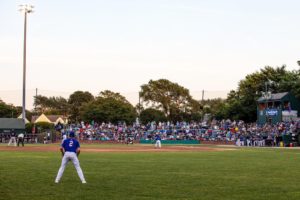
Each year in early June, Lane’s focus is on attracting residents of Cape Cod to come to games. He draws in locals by using the league’s social media platforms and word of mouth to emphasize the league’s family atmosphere and warm summer days.
In mid-July, the MLB draft takes place. The Cape League spotlights its players who were drafted into the Major Leagues, using social media posts, which appeal to the fans who follow the Cape League’s MLB prospects from far away.
Updating statistics
According to Lane, the Cape League’s fanbase is “pretty unique.”
“The demographic on Cape Cod, of people who go to the games, is relatively older,” Lane said. “But [we’re] trying to attract a younger demographic [as well].”
Part of being appealing to a younger audience means being “trendy.”
Lane noticed that many sports teams and other summer baseball leagues were “getting really creative” in the way that they attracted their young fans. Adapting to the ever-changing world of social media was something that Lane focused on when aiming to draw in a younger demographic.
Last summer, the Cape Cod Baseball League created its own TikTok account.
“We put an emphasis on putting time and effort into it, because it’s the biggest platform for young people right now,” Lane said.
With the use of individual team collaboration and cross-platform promotion, the account grew to about 9,500 followers, he noted.
Recruiting host families
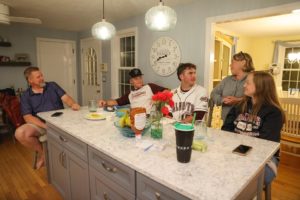
Another big reason why the Cape League operates the way it does is due to host families.
“The relationship between the host families and the league is phenomenal, because they provide so much [for us],” Lane noted.
Hosting seminars, creating Facebook groups and putting up local ads are just some of the ways the Cape League reaches out to potential host families. Due to the Cape’s close-knit nature, word of mouth is very common and has been key in securing host families.
“We really put an emphasis on making sure that they feel appreciated, because without them we wouldn’t be able to operate every summer,” Lane said.
Signing players
The players are the stars of the Cape League. They compete in the summer weather on high school fields with games ending in beautiful sunsets.
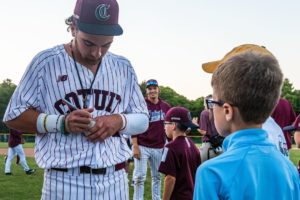
“And then, after the game, all these kids can just walk onto the field, get autographs and interact with the players,” Lane said. “I think a cool aspect of [the games] is that the communities welcome in all the players, and [those players] really become part of [the Cape Cod family] for those two months.
“The players buy in so easily every summer,” he said.
Last summer, Lane had the chance to witness an athlete become part of the Cape Cod community.
“I was at Chatham for a game, and I was walking around the left-field foul pole by the bullpens,” he explained. “One of the relief pitchers had a beach chair setup, and he was watching the game from a distance. There were about six kids sitting on the floor next to him playing. They were all just talking, laughing and having a good time.” A month later, the pitcher got drafted to the MLB and is now in the minor leagues.
The Cape League sets itself up for moments like the one Lane experienced to happen every game.
“You’re really not going to find it anywhere else,” Lane said.
Drafting sponsors
Because the Cape League is a nonprofit, it looks to obtain grants and work with sponsors that will help fund all aspects of the league.

As the director of corporate development, it is Ben Brink’s job to secure partnerships for the Cape League.
Brink, who previously served as the director of public relations, said, “There’s no real line that separates [being the director of corporate development and using public relations].
“There’s a big gray area where PR bleeds into corporate development and corporate development bleeds into PR — they both rely on each other,” he explained.
When recruiting a potential sponsor, it is key to have good PR to show, or else there is nothing to sell. In the case of the Cape League, it would be an article about the organization in the Boston Globe, a photo spread from Yankee Magazine or the fact that the games are broadcast on The New England Sports Network.
“It [also] works the other way,” Brink said. “[The sponsor] needs to know that our PR team is going to do a really good job promoting them.”
Joining the team
After Brink solidifies the relationship with the corporate partner, he finds that it’s important to “do what you say you’re going to do.”
“With every sponsor, there’s [about] 25 things that they’re paying for,” Brink said. “If they’re paying for 25 things, they better get 25 things.”
There are often limitations to what a nonprofit can do for a sponsor, but being “straightforward and honest” about those limitations is something Brink emphasizes in his work.
Team bonding
Another important part of working with sponsors is treating them like they matter.
“Making sure that you love them [is important]. Treat them like they are family, a part of the community, and check in with them” to maintain those relationships in the long run, Brink advised.
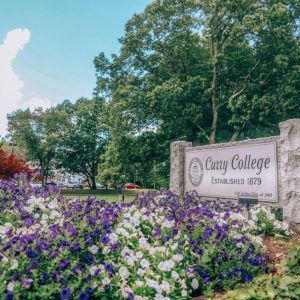
Curry College has been a sponsor of the Cape Cod Baseball League for about 25 years. After speaking with Brink, at the end of March 2022, the Curry College contact said they wouldn’t sponsor the league again.
“[This was mainly] because we’ve had changes in leadership, and he had been kind of forgotten about,” Brink said. “That’s where the love part comes in — you can’t just take their money and then call them back 12 months later and ask for money again.”
Brink was determined to get Curry College back as a sponsor.
By recognizing where the Cape League had failed his client and offering to “breathe new life” into their partnership, Brink was able to secure a sponsorship with Curry College.
“I think trust is probably the most important thing,” Brink said.
Teammates are for life
Every experience, relationship and memory that is created at a Cape League game or within the organization “lasts a lifetime,” according to Lane.
Lane has been going to games since he was 4 years old, and as a kid, he participated in youth clinics. He became friends with his coach, Danny Lehmann, and kept in touch with him even after Lehmann left the Cape.
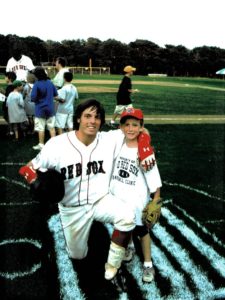
Lane is still in contact with Lehmann today.
“Those connections last a lifetime,” Lane said. “And I don’t really know if any other summer league has that kind of dynamic where a 4-year-old kid can become lifelong friends with a player just because they were there playing baseball for two months.”
The relationship-building tactics that the Cape League implement are a large part of why the league’s public relations efforts are successful and why people keep coming back to enjoy the unique experience of the games.
Lane and Brink run the Cape League like everyone is part of its family.




